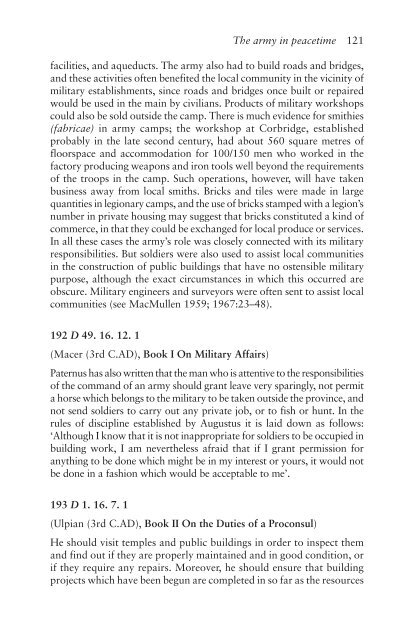The Roman Army, 31 BC–AD 337: A Sourcebook
The Roman Army, 31 BC–AD 337: A Sourcebook
The Roman Army, 31 BC–AD 337: A Sourcebook
You also want an ePaper? Increase the reach of your titles
YUMPU automatically turns print PDFs into web optimized ePapers that Google loves.
<strong>The</strong> army in peacetime 121<br />
facilities, and aqueducts. <strong>The</strong> army also had to build roads and bridges,<br />
and these activities often benefited the local community in the vicinity of<br />
military establishments, since roads and bridges once built or repaired<br />
would be used in the main by civilians. Products of military workshops<br />
could also be sold outside the camp. <strong>The</strong>re is much evidence for smithies<br />
(fabricae) in army camps; the workshop at Corbridge, established<br />
probably in the late second century, had about 560 square metres of<br />
floorspace and accommodation for 100/150 men who worked in the<br />
factory producing weapons and iron tools well beyond the requirements<br />
of the troops in the camp. Such operations, however, will have taken<br />
business away from local smiths. Bricks and tiles were made in large<br />
quantities in legionary camps, and the use of bricks stamped with a legion’s<br />
number in private housing may suggest that bricks constituted a kind of<br />
commerce, in that they could be exchanged for local produce or services.<br />
In all these cases the army’s role was closely connected with its military<br />
responsibilities. But soldiers were also used to assist local communities<br />
in the construction of public buildings that have no ostensible military<br />
purpose, although the exact circumstances in which this occurred are<br />
obscure. Military engineers and surveyors were often sent to assist local<br />
communities (see MacMullen 1959; 1967:23–48).<br />
192 D 49. 16. 12. 1<br />
(Macer (3rd C.AD), Book I On Military Affairs)<br />
Paternus has also written that the man who is attentive to the responsibilities<br />
of the command of an army should grant leave very sparingly, not permit<br />
a horse which belongs to the military to be taken outside the province, and<br />
not send soldiers to carry out any private job, or to fish or hunt. In the<br />
rules of discipline established by Augustus it is laid down as follows:<br />
‘Although I know that it is not inappropriate for soldiers to be occupied in<br />
building work, I am nevertheless afraid that if I grant permission for<br />
anything to be done which might be in my interest or yours, it would not<br />
be done in a fashion which would be acceptable to me’.<br />
193 D 1. 16. 7. 1<br />
(Ulpian (3rd C.AD), Book II On the Duties of a Proconsul)<br />
He should visit temples and public buildings in order to inspect them<br />
and find out if they are properly maintained and in good condition, or<br />
if they require any repairs. Moreover, he should ensure that building<br />
projects which have been begun are completed in so far as the resources



